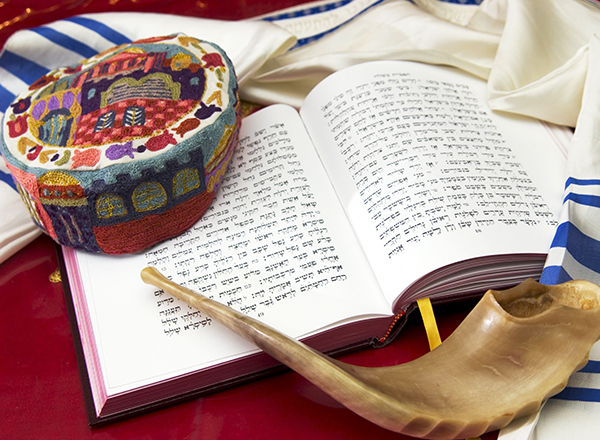by Cantorial Soloist Dr. Sammi Stinson
We are officially in the month of Elul, which means the greeting “L’shanah Tovah” (a good year) is appropriate. I looked it up before writing it. Practicing a religion with a 6,000 year history and several iterations of foreign languages means we spend a fair amount of time fretting over what is right and wrong, appropriate or inappropriate. We glance over our shoulders for the Shabbat Police (don’t worry, they don’t exist). In a tradition that encourages questions and debate, we search to find new meaning in each word of our liturgy, and each generation is commanded to re-interpret the laws for themselves. This is how Judaism survives.
Several times over the course of High Holiday services, we recite the piyyut (poem) Unataneh Tokef, which in part reads:
וּתְשׁוּבָה וּתְפִלָּה וּצְדָקָה מַעֲבִירִין אֶת רֹעַ הַגְּזֵרָה.
“u t’shuvah, u’tefilah, u’tzedakah meavirin et roah hagezerah” – Repentance, prayer, and charity temper the decree of Gd’s judgment.
As with many Hebrew words, this is a poetic translation, and we can find many words rooted within these three. T’shuvah, t’fillah, and tzedakah can literally mean “returning, contemplation, and righteousness.”
A couple of weeks ago, Daniel Levine and I spoke to the Religious School children about these “three T’s” as preparation for the High Holiday season. T’fillah and Tzedakah were more familiar to them; we have t’fillah each week in the sanctuary, and it is both prayerful and thoughtful. We put tzedakah money in boxes in our classrooms, and talk about the various levels of tzedakah as a way of tikkun olam – setting the world right.
But Teshuvah is harder. It’s more than saying “I’m sorry,” to each other or to G-d – which is hard enough. But returning? As kids, they look forward to changing and growing, not returning to what they were. How can we make the idea of “returning” different from “regressing?”
Rabbi John L. Rosove explains it this way: T’shuvah is a…turning away from yetzer hara – the evil inclination and embracing that which is good in our nature – yetzer hatov, such as living according to the virtues of humility, gratitude, generosity, compassion, and loving-kindness.
This is a major difference between Judaic beliefs and other faiths. We believe everyone is born good, and though we have free will our natural inclination is one of goodness. We should all want to return to our truest, best versions of ourselves this year. But it’s hard to pin down what that version is. Determining who you will return to being is a process. The month of Elul and High Holiday services are there in part to carve out time for this introspection. To whom will you return to being?
Rabbi Kerry Chaplin writes on the importance of self-compassion during our repentance:
Our prayers call out: “We trust in Divine Compassion” and “We hope for Divine forgivenesses!” Even saying these words, I remember that compassion exists and I am worthy of it. And by doing so in a communal prayer space, I know that we all need some help letting ourselves live with and learn from our mistakes and missteps. In our Jewish calendar, the High Holy Days are a time for cheshbon hanefesh, a spiritual accounting of our lives and actions so that we can continue to live more soulfully. It is only with compassion that we can thoroughly examine the parts of ourselves we might not like, feel ashamed about, or want to change.
This task of accountability and promise to change into a better version of ourselves is a daunting one. The “how” and “who” and “to what” I will return. Luckily, the “where will we return” is an easier question: Temple Shalom is our home for High Holiday introspection. This High Holiday season I am so grateful to be leading Temple Shalom’s services once again. I look forward to welcoming our community and guests in our large, warm sanctuary, and filling the space with music together. There we will find חשבון הנפש – cheshbon hanefesh – a compassionate examination of our souls. We will face these High Holidays together and draw strength from one another. Please join us.

